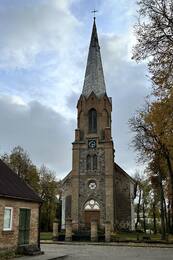Priest Erik Leijer
II World War II, IV Soviet Occupation
Erikas Leijeris (1906-1951) - Evangelical Lutheran priest, senior of the Lithuanian Evangelical Lutheran Church and president of the consistory, whose life reflects the dramatic turns in the history of the Lithuanian Church and nation in the face of the Soviet occupation.
Born on January 19, 1906 in Biržai to a Latvian family, E. Leijer studied at Biržai Gymnasium, later studied at the Evangelical Theology Faculty of Kaunas University, which he graduated on December 11, 1929. While still a student, on May 9, 1929, he was ordained a priest in Žeimelj due to the shortage of priests and served there until his arrest - about 20 years.
Despite his poor health, E. Leijeris devotedly performed his duties and actively participated in public activities. In 1932-1937, he served as the senior of the Lithuanian Latvian Evangelical Lutheran Synod, and in 1932-1936, he was a member of the consistory. For his merits, he was awarded the Order of the Grand Duke of Lithuania Gediminas, IV degree, and the Star of the Archers.
The particularly important role of E. Leijers became evident during a difficult period for the Church. On January 31, 1941, he was appointed the senior of the Evangelical Lutherans of all Lithuania, and on April 24, the chairman of the temporary Consistory. When in 1941 and 1944 almost all Evangelical Lutheran priests and most parishioners fled to Germany, Leijers remained in Lithuania and took care of the remaining parishes (out of 55, only 8 were active). After the war, he actively contributed to the restoration of parishes in the Klaipėda region.
During the years of Soviet occupation, E. Leijers courageously defended the interests of the Church: he opposed the closure of churches, wrote complaints and telegrams to the Soviet authorities, including A. Sniečkas and J. Stalin. In 1947, on his initiative, the 400th anniversary of the Catechism of Martynas Mažvydas was celebrated in all Lithuanian parishes. He actively protested against the seizure of the churches of Joniškis, Pagėgiai, Skaudvilė, Pakruojis and others. He held services at the doors of the closed church.
Priest E. Leijer also distinguished himself by hiding and taking care of Marija Raštikytė, the daughter of the commander of the Lithuanian army, General Stasys Raštikys, who was threatened with a second exile to Siberia. Leijer provided the girl with new documents and educated her himself.
E. Leijer's courage and integrity cost him his freedom. On December 30, 1949, after a protest telegram to Stalin regarding the conversion of the Joniškis church into a grain warehouse, he was arrested. On November 11, 1950, he was convicted of "anti-Soviet activities" and exiled to the Mikhailovka camp in the Krasnoyarsk Territory. In exile, he continued his spiritual ministry, serving the faithful.
E. Leijer died on December 31, 1951 in the camp. His grave, located 17 kilometers from the camp, remained unknown, because the prisoners could not accompany him on his last journey further than the camp gates. A monument was erected in his memory at the Žeimelis cemetery. On December 25, 1989, E. Leijer was rehabilitated.
E. Leijer's fate reflects not only a personal tragedy, but also the broader persecution of the Lutheran community during the Soviet era, when this denomination was the only one to suffer solely because of the religion it professed, as it was identified with the German community.
More information sources
Related objects
Žeimelis Evangelical Lutheran Church
In the center of the town of Žeimelis stands the Žeimelis Evangelical Lutheran Church. It was built in 1793, on the site of the old church built in 1540. In 1753–1759, the priest in Žeimelis was the Latvian writer and folklorist priest Gothardas Frydrichas Stenderis, who created the first grammar of the Latvian language.
From 1929 to 1949, the church was served by the priest Erik Leijer, who became famous for his fight for the preservation of churches during the Nazi and Soviet occupations. E. Leijer did not leave Lithuania in 1941, when almost all Evangelical Lutheran priests had fled to Germany (only 8 parishes out of 55 were active), and he took care of Evangelical Lutheran parishes throughout the country.
During the Soviet occupation, he actively opposed the closure of churches, restored parishes, appointed clergy to them, and protested against the confiscation of churches and the arrest of priest Jurgis Gavėnys. He hid Meilutė Marija Raštikytė-Alksnienė, the daughter of General Stasys Raštikys, Commander-in-Chief of the Lithuanian Army, and a relative of President Antanas Smetona, from exile at his home. E. Leijeris provided her with new documents and took care of her education himself, not allowing her to go to school.
At the end of 1949 he was arrested by Soviet structures, convicted "for anti-Soviet activities" and exiled to the Krasnoyarsk Territory. He died in 1951 in the Mikhailovka camp, the place of his grave is unknown. In 1989 he was rehabilitated.
A monument was erected in memory of E. Leijers in the cemetery of the town of Žeimelis, a street was named after him, and a memorial plaque was hung in the church.






